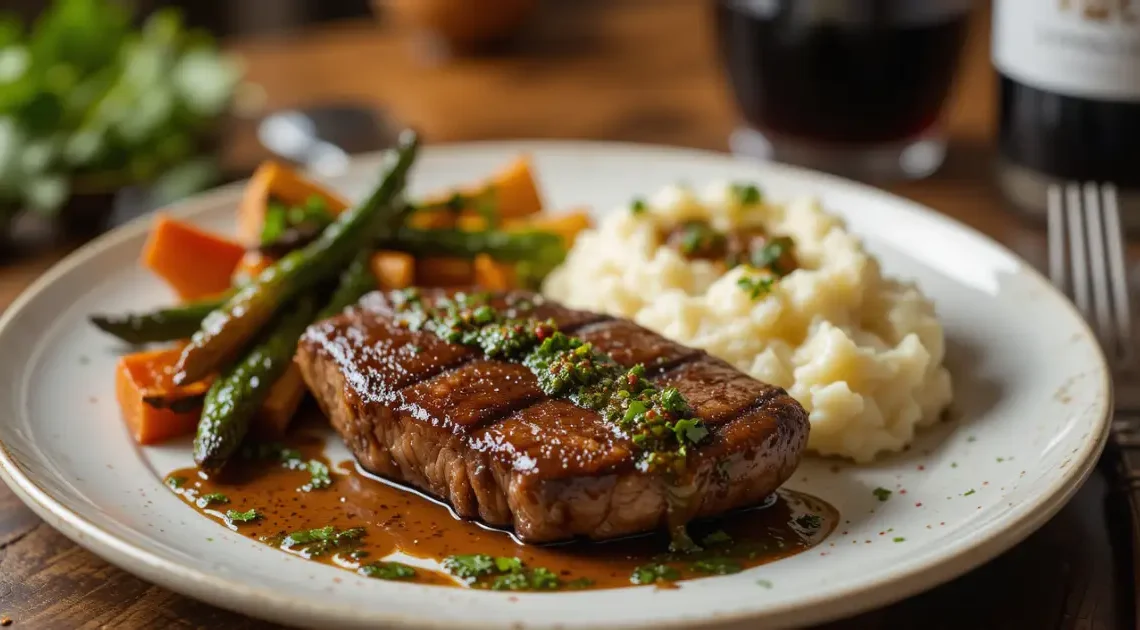
Flat iron steak, derived from the beef shoulder or chuck, is a culinary gem that has become a favorite among chefs and home cooks alike. This tender, well-marbled cut offers exceptional flavor and versatility, making it an ideal choice for a variety of cooking methods. Whether grilled, pan-seared, or broiled, its unique combination of tenderness and robust taste ensures a memorable dining experience.
One of the reasons for its growing popularity is its affordability compared to other premium cuts, without compromising quality or flavor. As more consumers prioritize quality and value, understanding the intricacies of a beef loin flat iron steak label has become essential. These labels reveal critical information about the steak’s grade, origin, and freshness—key factors in selecting a cut that meets culinary expectations.
This guide delves into the art of selecting and preparing flat iron steak, decoding the details on a beef loin flat iron steak label, and offering practical tips for perfect preparation. Readers will gain insights into USDA grading, the significance of marbling, and the importance of freshness. By the end, you’ll be equipped with the knowledge to choose the finest flat iron steak and elevate your cooking repertoire with confidence.
What Are Beef Loin Flat Iron Steak Labels?
Understanding the Purpose of Steak Labels
A beef loin flat iron steak label serves as a vital guide for consumers, providing crucial information to ensure the selection of a high-quality cut. These labels not only reflect the steak’s origin but also its overall quality, offering transparency for discerning buyers. Understanding what these labels convey is key to making informed choices.
Key Information Found on Labels
Steak labels provide essential details, such as the packaging date and expiration date, which are indispensable for gauging freshness. The USDA grading system, prominently displayed on many labels, categorizes the steak based on marbling, tenderness, and overall quality. Grades such as Prime, Choice, and Select indicate varying levels of excellence, with Prime being the highest, denoting superior marbling and flavor.
How Labels Reflect Beef Quality
Country of origin labeling (COOL) is another critical component of a beef loin flat iron steak label. This designation informs consumers where the beef was sourced, a factor that can influence flavor profiles and ethical considerations.
These labels ultimately serve as a window into the steak’s journey from farm to table. For instance, a Choice-grade flat iron steak promises a balance of affordability and quality, while a Prime-grade cut is ideal for premium occasions. By decoding the nuances of these labels, consumers can select cuts that align perfectly with their culinary ambitions and taste preferences.
Table of Contents
Understanding Flat Iron Steak
What Is Flat Iron Steak?
Flat iron steak is a relatively modern discovery in the culinary world, sourced from the shoulder or chuck primal of the cow. This cut is derived specifically from the top blade muscle, where careful butchering removes tough connective tissue to reveal a remarkably tender piece of meat. Its origin lies in innovative butchering techniques aimed at maximizing the potential of lesser-used cuts.
What sets flat iron steak apart is its unique combination of tenderness, rich marbling, and robust flavor. With a texture rivaling premium cuts like filet mignon and a flavor profile comparable to ribeye, it offers the best of both worlds. The even marbling throughout enhances juiciness and flavor, making it a favorite for grilling and other high-heat cooking methods. Unlike some cuts, flat iron steak maintains its tenderness even when cooked to medium or medium well, making it versatile and forgiving.
When compared to other popular cuts, flat iron steak stands out as a middle ground between affordability and quality. Unlike ribeye or New York strip, it’s more budget-friendly without sacrificing flavor or tenderness.
Why It’s a Must-Try
Flat iron steak’s versatility is unmatched. It shines whether grilled, pan-seared, broiled, or even stir-fried. It’s perfect for everyday meals thanks to its affordability and ease of preparation, yet elegant enough for special occasions. For those seeking a steak that delivers premium flavor without the premium price tag, flat iron steak is an exceptional choice.
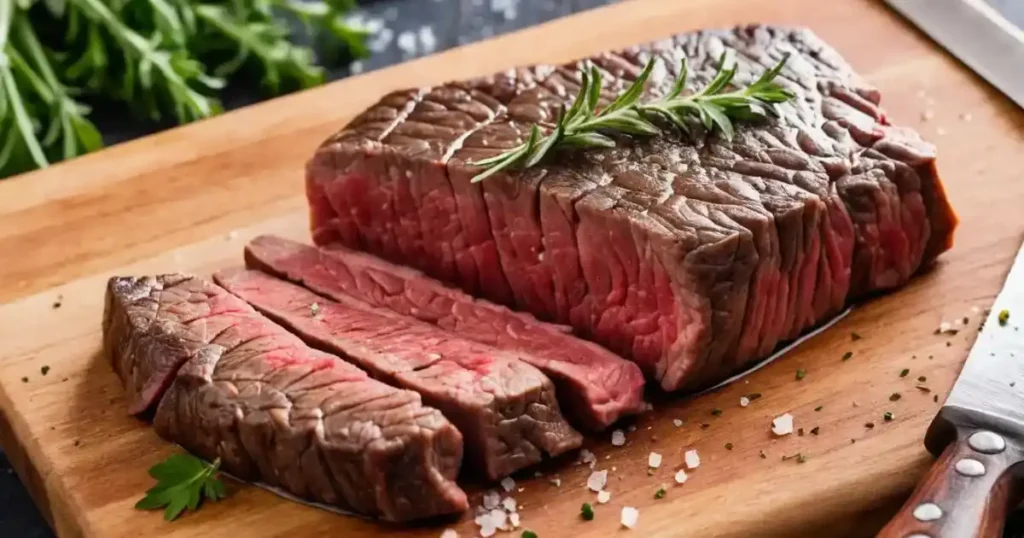
Preparation Basics:
Flat Iron Steak Marinades and Seasonings
Marinating flat iron steak is one of the most effective ways to elevate its flavor and tenderness. The marinating process allows seasonings, herbs, and acidic components like citrus juice or vinegar to penetrate the steak, breaking down muscle fibers and enhancing the natural flavors. This is particularly valuable for flat iron steak, as it amplifies its robust taste while ensuring each bite is juicy and tender.
For a classic marinade, combine olive oil, garlic, rosemary, and a splash of balsamic vinegar. If you’re looking for an Asian-inspired twist, try a mix of soy sauce, sesame oil, ginger, and a touch of honey. For smoky or spicy flavors, consider chipotle peppers, smoked paprika, or cayenne blended with lime juice.
Dry rubs and seasoning blends are also excellent options. A simple mix of kosher salt, cracked black pepper, and garlic powder can work wonders. For a more adventurous approach, experiment with blends like Cajun spices or herbes de Provence. Always let the steak rest with the marinade or rub for at least 30 minutes, or longer if time allows, to maximize flavor absorption.
Tools of the Trade
Having the right tools ensures your flat iron steak reaches its full potential. An instant-read thermometer is indispensable for checking internal temperature and avoiding over- or under-cooking. Aim for 130–135°F for medium-rare, ensuring optimal tenderness.
Other essential tools include a sharp chef’s knife for trimming any excess fat, a heavy-duty skillet or grill pan for an even sear, and sturdy tongs for flipping the steak without piercing the meat. For grilling, a meat-safe brush to apply marinades and a wire brush for keeping the grill clean are also useful. Equipped with these tools, you’ll be ready to prepare flat iron steak like a pro.
Cooking Techniques
How to Cook Flat Iron Steak: Methods for Every Preference
Flat iron steak’s versatility shines through its ability to adapt to a variety of cooking methods, each bringing out unique flavors and textures. Here’s how to master each approach:
- Grilling
Grilling is perfect for achieving a smoky flavor and charred crust. Preheat the grill to high, season the steak, and sear it for 3-5 minutes per side. Use direct heat for the initial sear, then move to indirect heat to finish cooking to your preferred doneness. - Stove-top (Pan-Searing)
Pan-searing delivers a restaurant-quality crust. Heat a heavy-duty skillet or cast iron pan until it’s smoking hot. Drizzle oil into the pan and cook the steak for 3-4 minutes on each side. Finish with a pat of butter and herbs like thyme or rosemary for a luxurious finish. - Broiling
Broiling is a quick and effective method using high heat. Place the steak on a broiler pan and cook about 4 inches from the heat source. Flip midway for even cooking, and watch closely to avoid overcooking. - Sous-Vide
Sous-vide ensures precise doneness. Seal the steak in a vacuum bag, cook at 130°F for medium-rare, then sear quickly on a hot skillet to develop a crust. - Smoking
Smoking infuses deep, rich flavors into the steak. Use a smoker set to 225°F, and smoke the steak for 1-2 hours until it reaches the desired internal temperature. Finish with a quick search for texture. - Stir-Frying
For a quick meal, slice the steak thinly against the grain and stir-fry over high heat with vegetables and a flavorful sauce. This method works especially well for Asian-inspired dishes.
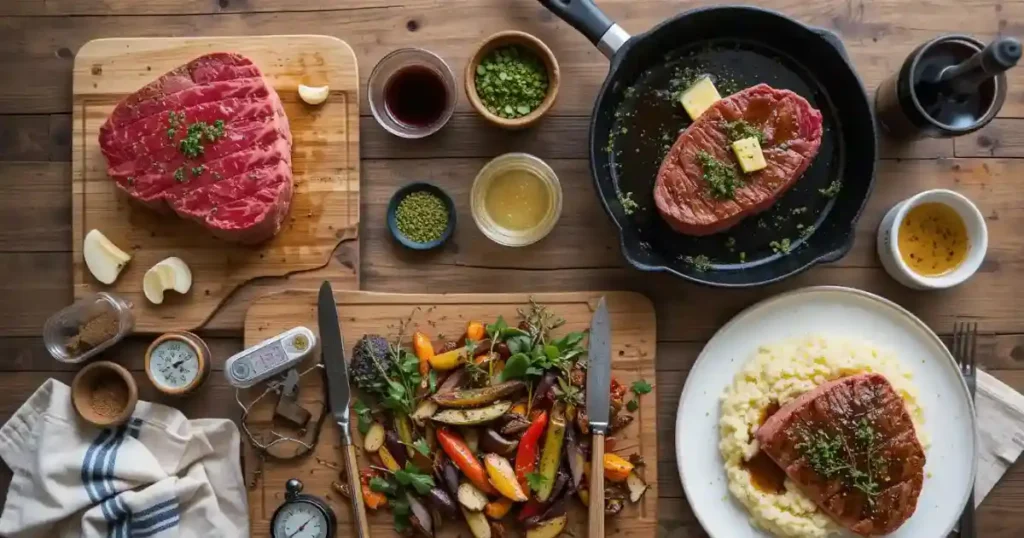
Common Cooking Challenges
Cooking flat iron steak can present challenges, but these tips will help you avoid pitfalls:
- Why Cook Times Vary
Thickness and marbling affect cook times. Always use a thermometer to ensure accuracy rather than relying solely on time. - Avoiding Overcooking or Undercooking
Flat iron steak cooks quickly, so monitor closely. Remove the steak from the heat slightly below your target doneness, allowing carryover cooking to achieve the perfect temperature. - Resting the Steak
Let the steak rest for 5-10 minutes post-cooking. This helps the juices to settle evenly, making each bite tender and full of flavor.
Pairing and Serving
What to Serve With Flat Iron Steak
Flat iron steak is incredibly versatile, and pairing it with the right accompaniments can elevate your meal to restaurant-quality perfection. Here are some options:
- Side Dishes
Roasted vegetables like asparagus, Brussels sprouts, or carrots bring a vibrant contrast to the steak’s richness. Creamy mashed potatoes or a buttery baked potato provide a comforting base. Fresh salads with tangy vinaigrettes add brightness and balance to the plate. - Sauces and Toppings
Enhance the steak’s natural flavor with classic sauces like chimichurri, which offers a zesty and herbaceous kick. Blue cheese butter adds a creamy, indulgent touch, while a savory mushroom sauce deepens the flavor profile. For a smoky edge, a drizzle of barbecue sauce works beautifully.
Flat Iron Steak Salad with Honey Balsamic Dressing
This salad transforms flat iron steak into a vibrant, crowd-pleasing dish. It’s perfect for a light yet satisfying meal or as a centerpiece for a dinner gathering.
- Key Components
Begin with perfectly cooked slices of flat iron steak, seasoned and seared to your liking. Toss together fresh greens such as arugula, spinach, or mixed lettuce, and add candied pecans for a sweet crunch. A honey balsamic dressing ties the flavors together with its sweet and tangy profile. - Quick Assembly Guide
Grill or pan-sear the steak, allowing it to rest before slicing thinly. Whisk together honey, balsamic vinegar, olive oil, and Dijon mustard for the dressing. Toast pecans with sugar and butter until caramelized, then let cool. Layer the greens, steak, pecans, and dressing on a plate for a beautiful and balanced presentation.
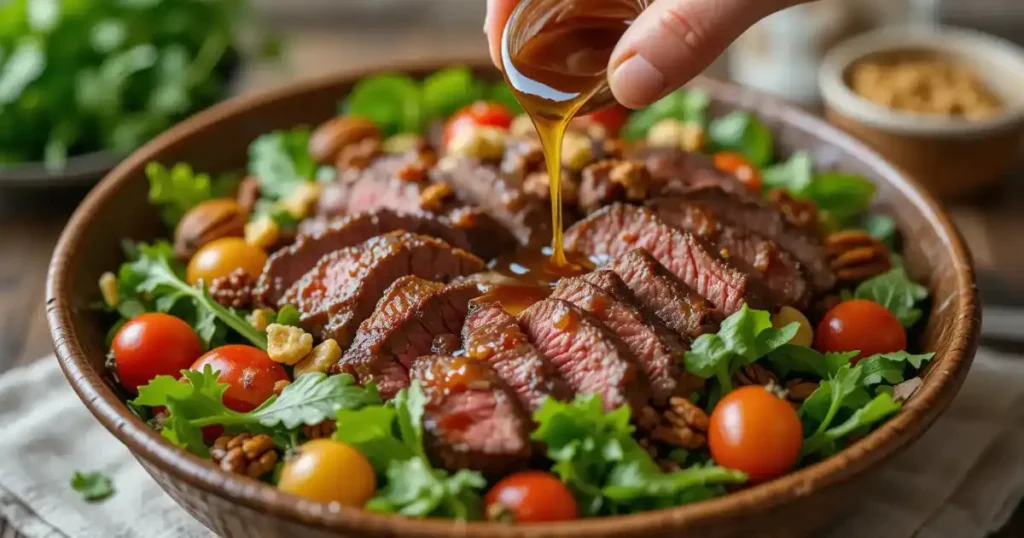
Frequently Asked Questions (FAQs)
What defines a flat iron steak?
Flat iron steak is a cut taken from the shoulder or chuck primal of the cow, specifically the top blade muscle. It is known for its tenderness and marbling, achieved through precise butchering that removes tough connective tissue. This cut is prized for combining affordability with exceptional flavor.
How would you characterize flat iron steak?
Flat iron steak is a well-marbled, tender cut with a robust, beefy flavor. It has a smooth texture that holds up well to various cooking methods, making it both versatile and satisfying. Its flavor and tenderness are comparable to more premium cuts like ribeye.
Is flat iron steak cost-effective?
Yes, flat iron steak is an economical choice that offers premium taste and tenderness at a lower price point than cuts like ribeye or filet mignon. Its affordability makes it a popular option for both everyday meals and special occasions.
Does flat iron steak offer premium quality?
Flat iron steak delivers a premium eating experience with its excellent marbling, tenderness, and rich flavor. While it may not have the prestige of filet mignon or ribeye, it consistently provides high-quality results when cooked properly.
How can flat iron steak be used?
Flat iron steak is versatile and can be grilled, pan-seared, broiled, stir-fried, or cooked sous-vide. It works beautifully as a centerpiece steak or sliced thin for salads, tacos, or sandwiches. Its versatility makes it ideal for use in a wide range of cuisines and dishes.

Conclusion
Flat iron steak stands out as an exceptional choice for any meal, offering a perfect balance of tenderness, flavor, and affordability. Its versatility makes it suitable for a variety of cooking methods, from grilling to stir-frying, ensuring it can adapt to any culinary occasion.
Whether you’re preparing a quick weeknight dinner or an elegant dish for guests, flat iron steak delivers consistent and delicious results. Explore different cooking techniques, pairings, and seasonings to discover what works best for your taste.
Ready to elevate your meals? Experiment with flat iron steak, enjoy its unbeatable flavor and share your experiences. We’d love to hear your feedback and creative ideas!
Print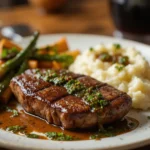
Your Ultimate Guide to Beef Loin Flat Iron Steak Labels
- Total Time: 25 minutes
- Yield: 4 1x
Description
A detailed guide to preparing a juicy and flavorful flat iron steak, complete with tips on marinating, cooking, and serving for a restaurant-quality meal at home.
Ingredients
- 1 flat iron steak (1.5 pounds)
- 3 tablespoons olive oil
- 2 garlic cloves, minced
- 2 tablespoons soy sauce
- 1 teaspoon fresh rosemary, chopped
- 1 teaspoon fresh thyme, chopped
- 1 teaspoon coarse salt
- 1/2 teaspoon cracked black pepper
- Optional: Chimichurri sauce for serving
Instructions
- Prepare the Marinade
Combine olive oil, garlic, soy sauce, rosemary, thyme, salt, and pepper in a mixing bowl. Place the flat iron steak in the mixture, ensuring it is fully coated. Cover and refrigerate for at least 30 minutes. - Heat the Skillet
Preheat a cast iron skillet over high heat until smoking hot. Add a drizzle of olive oil. - Sear the Steak
Remove the steak from the marinade, letting excess drip off. Sear for 3-4 minutes per side or until the desired crust is achieved. - Check the Temperature
Use an instant-read thermometer to check doneness. Remove from heat when the internal temperature reaches 130°F for medium-rare. - Rest the Steak
Transfer the steak to a cutting board and tent loosely with aluminum foil. Let it rest for 5-10 minutes. - Slice and Serve
Slice the steak thinly against the grain. Serve with chimichurri sauce and side dishes of your choice.
Notes
- Ensure the steak is rested for 5-10 minutes after cooking to allow juices to redistribute.
- Use a thermometer to achieve the perfect doneness: 130°F for medium-rare.
- Marinate the steak for at least 30 minutes or up to overnight for enhanced flavor.
- Prep Time: 15 minutes
- Cook Time: 10 minutes
- Category: Main Course
- Method: keto friendly
- Cuisine: American
Nutrition
- Calories: 350
Keywords: Flat iron steak recipe, beef loin steak, easy steak recipe, marinated flat iron steak, steak dinner


